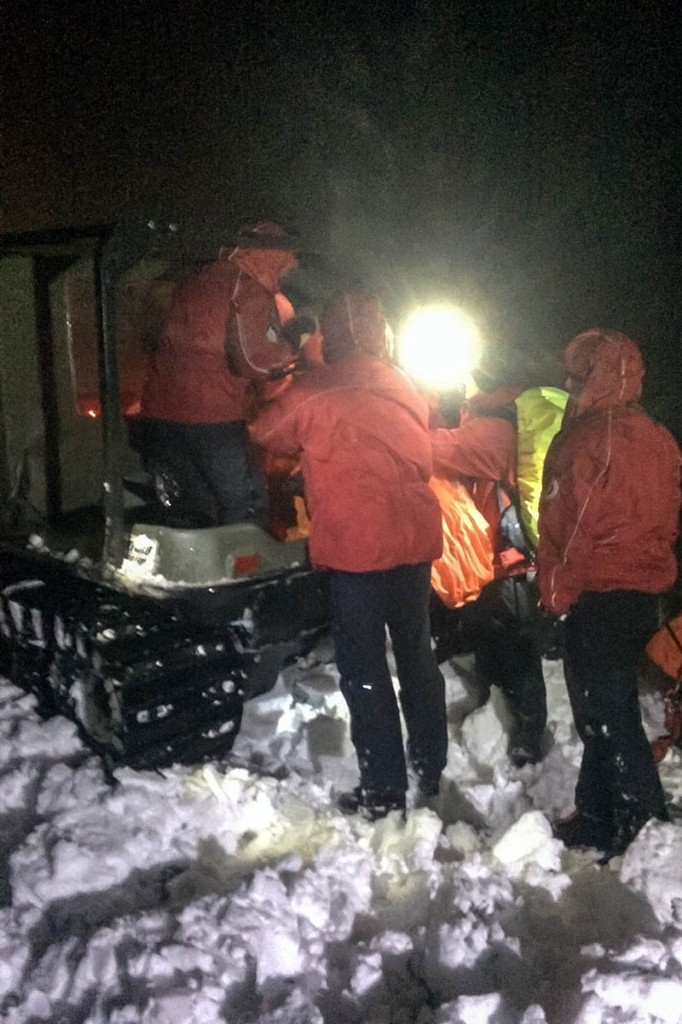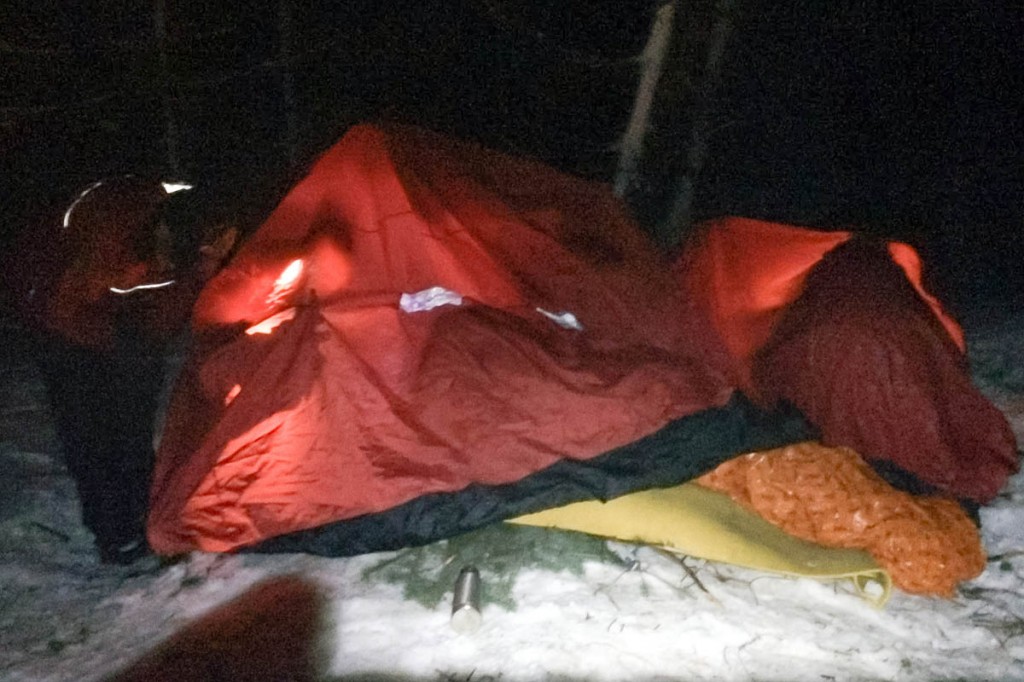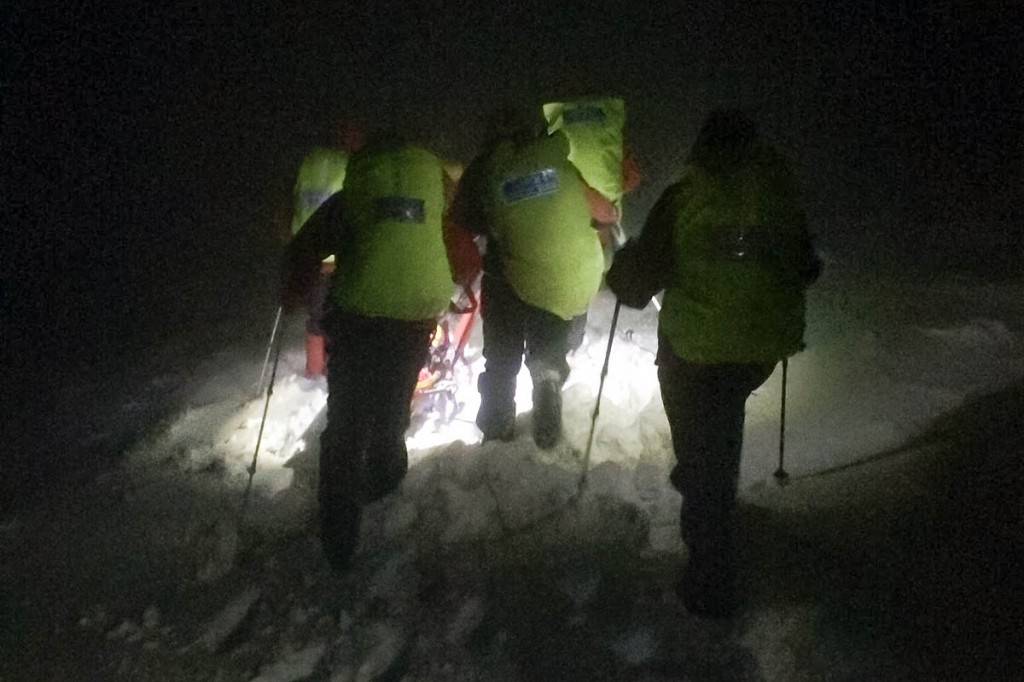
Farmers helped rescuers by making their specialised all-terrain vehicles available. Photo: Northumberland NPMRT
More than 60 volunteer mountain rescuers had to battle through waist-deep snowdrifts to reach a large group who got into difficulties in the Cheviots.
Four teams were involved in the operation to bring the walkers and two dogs to safety from Windy Gyle on the England-Scotland border on Sunday.
At one point rescue team members were forced to crawl through drifts as high winds and blizzards swept the hills.
A Coastguard helicopter also flew to the scene but was unable to reach the walkers because of low cloud. It took more than 10 hours to get the group from the fells.
Northumberland National Park Mountain Rescue Team and North of Tyne Mountain Rescue Team were called out by Northumbria Police shortly after 3pm after a call for help. Initial reports indicated 10 walkers and two dogs were stranded on Windy Gyle and two of the group were suffering from hypothermia.
A Northumberland NPMRT spokesperson said: “Local team members were deployed immediately to head up onto Windy Gyle.
“Additional members and resources from were also deployed along with a request for support from north of the border. Tweed Valley Mountain Rescue Team and Border Search and Rescue Unit duly responded.
“As members were nearing the summit of Windy Gyle, further information suggested the walkers had headed east to try to locate some shelter. After 3½ hours in challenging winter conditions the group of walkers was located.
“Team members had to wade through three- to four-foot snowdrifts, sometimes even crawl, to reach the walkers’ location.”
The spokesperson said all the walkers were suffering from the effects of cold, with three requiring more urgent treatment and evacuation.
The Tweed Valley team set up a control centre at the remote Cocklawfoot Farm from where the incident could be managed and deployed 16 members onto the hill. They were soon joined by 13 members of the Border Search and Rescue Unit, who had received the call on their way back from an annual winter training weekend in the Cairngorms, and travelled direct to the incident.
A BSARU spokesperson said: “Conditions up on the Border Ridge were every bit as harsh as those the team had just left behind in the Cairngorms, with deep drifting snow on a biting north-easterly wind making progress difficult.
“The party of 10 had been practising for a summer endurance event in the Cheviots and, underestimating the severity of the conditions, were travelling fairly light.
“The party was fit and reasonably well equipped, but not adequately prepared for the conditions they encountered on the ridge. One of the party managed to lose both shoes when they were sucked off in a deep bog, and continued for some distance barefoot in the deep snow. This casualty was the most serious, and a further two needed treatment for hypothermia.”
A doctor from the Tweed Valley team and a North East Ambulance Service paramedic who is also a mountain rescue team member assessed all of the walkers. A Coastguard helicopter was requested and the Sikorsky S-92 from Prestwick attempted to fly in, almost reaching the walkers’ location. Cloud on the tops and drifting snow prevented the aircraft getting to the site.
The team spokesperson said: “The back-up plan was for the farmer from Rowhope in his tracked vehicle to transport the casualties requiring immediate evacuation down to the valley and for the remaining members of the group to be walked off by mountain rescue members. The plan was duly put into practice.
“A number of the walkers were taken direct to hospital after a further assessment by the North East Ambulance Service and we hope they make a swift recovery from their ordeal.”
The walkers and rescuers were all off the hill shortly after midnight on Monday.
Northumberland NPMRT team leader Iain Nixon said: “I would thank all the agencies involved and in particular praise the efforts of the farmer from Rowhope, without whose assistance the rescue would have taken much longer. The collective efforts of all involved ensured a successful outcome.”
The BSARU spokesperson said: “A huge thanks must go the farmers at Cocklawfoot and The Trows for helping the teams with access to the ridge and the use of a couple of specialised high-terrain off-road vehicles.
“Without their unquestioning and generous help, the operation would have been a lot more difficult, protracted and ultimately uncomfortable for all concerned.
“It is perfectly possible to keep warm and safe in challenging conditions if you are fit, properly equipped and have the navigational skills and hillcraft necessary to tackle full winter mountaineering.
“As this incident shows, it only takes a silly accident to change things dramatically. The party had left a route-card detailing their intended route, which is essential, and had done almost everything right.
“They were forced to deviate from their intended route in order to find shelter in some woodland when things went wrong, which necessitated a bit of a search before they were located.”
The operation involved 64 mountain rescue team members from both sides of the border.

